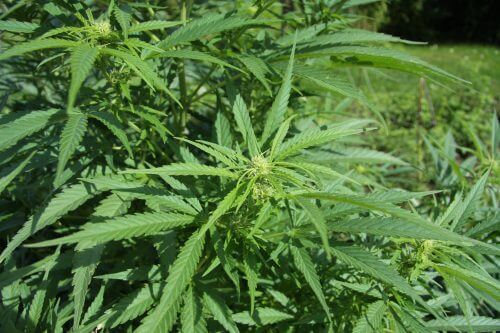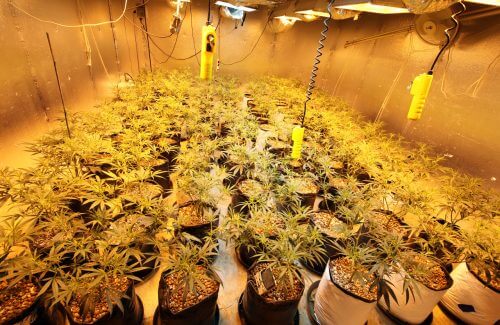Researchers are fighting bureaucracy and regulation and trying to examine whether medical cannabis can be used as a substitute for addictive opioids

Jeremy Hsu, The article is published with the approval of Scientific American Israel and the Ort Israel network 11.09.2016
Six days before the death of Prince, the pop star who became a legend in his lifetime, he was hospitalized after apparently taking an overdose of a painkiller called Percocet. His death on April 21, 2016 was related to an overdose of another pain reliever, named Fentanyl. WatchOpioids These are marketed as prescription pain relievers and are given to millions of Americans each year - often at the cost of addiction to ever-increasing doses and risk of overdose. The US Department of Health issued a statement that "an unprecedented opioid epidemic is currently raging in the US." Prescription opioid overdoses killed 165,000 Americans in 1999-2014. And according to estimates, the health and social costs of addiction to these drugs reach 55 billion dollars every year. This problematic situation spurs the experts to find a less dangerous alternative to the painkillers. Studies conducted on teachers about medical marijuana as a possible solution.
Already 15 years ago, rumors were spreading among doctors that patients suffering from pain prefer to use cannabis instead of the opioids given to them as prescription drugs. Inspired by these rumors, a research team led by Marcus Bachhuber, a professor of medicine at the Montefiore Medical Center in New York, to examine whether the legalization of medical cannabis in some of the US states affected the number of deaths that occurred in them due to taking an overdose of opioids. The study, published in 2014, revealed an interesting trend. In countries where the use of marijuana for medical purposes was allowed in 1999-2010 or earlier, the number of opioid overdose deaths each year was found to be about 25% lower than in countries where the ban on the use of cannabis remained intact.
Admittedly, it is impossible to conclude from Bachhuber's research that the use of medical cannabis is the direct cause of the decrease in the number of opioid overdose deaths. Moreover, the number of opioid overdose deaths includes both deaths caused by prescription drugs and those caused by the use of the illegal drug heroin (which also belongs to the opioid family). In any case, the study enlightened the eyes of many researchers and directed their attention to the connection between the use of marijuana and the use of painkillers. "In my opinion, medical cannabis can be used as one of the alternatives for the treatment of chronic pain, thus eliminating the use of opioids or at least allowing the taking of opioids in smaller doses," says Bachhuber.

Recent large-scale studies confirm this opinion. June 2016 issue of the Journal of Pain Report on a survey Conducted by researchers at the University of Michigan in which they retrospectively examined reports of 185 patients who used to visit a medical cannabis distribution center in Ann Arbor, Michigan. These patients, who suffer from chronic pain, reported a decrease of more than 50% in the use of opioids for pain relief. At the same time, animal studies show that cannabinoids, active chemical compounds found in marijuana, can work synergistically with opioids to relieve pain.
Medical cannabis was also a hot topic on the agenda of the American Pain Association at the annual conference Hers held in May 2016, says Simon the Rotonian, who heads the clinical research team at the Washington University Pain Center in St. Louis. The Rotonian is one of the authors of Article Published in February 2016 in the online edition of the Clinical Journal of Pain, which summarizes a study conducted in Israel during which a group of 176 patients suffering from chronic pain were followed for seven months. The study found that 44% of them stopped taking opioid prescription drugs within seven months of starting to use medical cannabis. This study is one of several recent observational studies that all point to the relationship between the use of medical cannabis and the reduction of opioid dependence.
Each of these studies has its own limitations. Retrospective studies cannot reveal essential details, for example, whether the overdose deaths are of patients who used prescription opioids or of people who took them as drugs or for self-medication without a prescription. And although the observational study of the Rotonian was conducted in real time, the participants were pre-screened to detect psychiatric disorders or a tendency to drug addiction. The subjects in this research group were therefore less likely to suffer from complications due to the use of medical cannabis compared to the general population suffering from chronic pain. "We don't have enough data on the long-term effects [of the use of medical cannabis] nor on the consequences in wider population groups that have not been so carefully selected," explains Harutonian.
As for the safety of using medical cannabis as an alternative to opioids, at the end of 2015, findings of One of the extensive studies the most held so far on the subject. The study followed a group of 200 patients over 12 months. And unlike previous studies, this study made a direct comparison between a group of medical cannabis users and a control group of patients suffering from chronic pain who were not treated with this drug. The study found some increase in the risk of mild adverse effects in the medical cannabis user group, but found no difference in the risk of serious adverse effects between this group and the control group.
Experimental clinical studies will be able to provide unequivocal answers regarding any causal relationships between the use of medical cannabis and the reduction of opioid use, says Mark Weir, head of clinical research at the Alan Edwards Pain Management Unit at McGill University in Montreal and lead author of the article on the safety of medical cannabis use published in the Journal of Pain. However, the experimental research on the use of medical cannabis is still facing difficulties in the USA, because cannabis is defined in it as a dangerous drug of the first degree, "which currently has no accepted medical use and is prone to causing addiction." Similar restrictions on the use of cannabis are also practiced in many other countries, and they make it difficult for research personnel seeking to obtain cannabis legally or to obtain permission for clinical trials in cannabis.
Such experiments are essential for progress in research, as they will allow determining whether and to what extent cannabis is safe to use. All the experts interviewed for this article see medical cannabis as a possible alternative solution for treating chronic pain, but many of them express concern about haste in its application as long as the long-term effects of marijuana, which carries its own risks of addiction and unwanted side effects, have not been fully clarified.

"We can operate in all those states [in the US] where the use of medical cannabis has been allowed," he says Kevin Bunke, a doctoral student in environmental and public health sciences at the University of Michigan and one of the authors of the paper published in Ann Arbor. "But at this point, what we really need is a policy that will determine how the scientific community can research cannabis and get it to catch up with reality in this field."
The political positions on the issue of cannabis are changing at an accelerated rate recently. On June 8, 2016, Ohio joined 24 US states and the District of Columbia, where the use of medical cannabis has already been allowed. Also the US Drug Enforcement Administration (DEA) reconsidered the definition of marijuana as a dangerous drug of the first degree, and this, in light of scientific and medical assessments it received from the Food and Drug Administration (FDA) in early 2016. [However, on August 11, 2016, the DEA announced its decision to keep cannabis in the classification of a dangerous drug of the first degree , with some easing in licensing the use of cannabis for research purposes. The decision was stretched Harsh criticism. Israel, on the other hand, facilitates research in medical cannabis and was done In recent years, a global focus on the subject - the editors of the Hebrew edition]
Medical cannabis is not expected to replace opioids in all medical conditions. For example, there are almost no disagreements regarding the necessity of using opioids in the treatment of terminally ill or cancer patients suffering from severe pain as well as in difficult surgeries and in cases of bone fractures. But as a non-cancer pain reliever, medical cannabis may prove to be a superior long-term alternative. Even the harshest critics, says Bachhuber, will agree that as far as the risk of fatal overdose is concerned, medical cannabis is safer to use than any opioid of any kind.

2 תגובות
Thanks for sharing
Cannabis can certainly help relieve a variety of pains and even in cases of chronic pain.
In addition, cannabis helps with sleep, anxiety, appetite, inflammation and other kinds of symptoms.
Since there is not enough research these days most focus on two cannabinoids, THC and CBD (cibid).
The THC is the one responsible for the feeling of intoxication ("high") and it is recommended to consume it in a low dose.
On the other hand, the CBD is the relaxing cannabinoid that helps with many symptoms of pain, depression and many more.
In order to purchase CBD in Israel you need to have a medical cannabis permit or you can purchase it from websites abroad where the CBD is available to everyone in any chain of pharmacies and even convenience stores.
It is very important to make sure that you are purchasing Cibidi from an authorized store that provides products that have undergone third-party laboratory tests and not inferior products with hemp instead of Cibidi.
Another thing that is recommended to be careful about is to purchase full-spectrum cibidi products that include a selection of cannabinoids that work together and create the entourage effect. In case you are sensitive to THC, you can also purchase broad-spectrum cibidi products that do not include THC but include the other cannabinoids.
Cibidi products come in a variety of forms of oils, candies and chocolates, creams and care products, essences, oils for vaping in a vaporizer (vapes), capsules, inhalers, pure oil and more